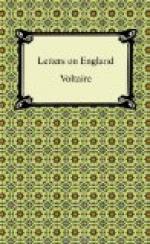This extract, in the original (not in the faint translation I have given you of it), may be compared to the description of la Molesse (softness or effeminacy), in Boileau’s “Lutrin.”
Methinks I now have given you specimens enough from the English poets. I have made some transient mention of their philosophers, but as for good historians among them, I don’t know of any; and, indeed, a Frenchman was forced to write their history. Possibly the English genius, which is either languid or impetuous, has not yet acquired that unaffected eloquence, that plain but majestic air which history requires. Possibly too, the spirit of party which exhibits objects in a dim and confused light may have sunk the credit of their historians. One half of the nation is always at variance with the other half. I have met with people who assured me that the Duke of Marlborough was a coward, and that Mr. Pope was a fool; just as some Jesuits in France declare Pascal to have been a man of little or no genius, and some Jansenists affirm Father Bourdaloue to have been a mere babbler. The Jacobites consider Mary Queen of Scots as a pious heroine, but those of an opposite party look upon her as a prostitute, an adulteress, a murderer. Thus the English have memorials of the several reigns, but no such thing as a history. There is, indeed, now living, one Mr. Gordon (the public are obliged to him for a translation of Tacitus), who is very capable of writing the history of his own country, but Rapin de Thoyras got the start of him. To conclude, in my opinion the English have not such good historians as the French have no such thing as a real tragedy, have several delightful comedies, some wonderful passages in certain of their poems, and boast of philosophers that are worthy of instructing mankind. The English have reaped very great benefit from the writers of our nation, and therefore we ought (since they have not scrupled to be in our debt) to borrow from them. Both the English and we came after the Italians, who have been our instructors in all the arts, and whom we have surpassed in some. I cannot determine which of the three nations ought to be honoured with the palm; but happy the writer who could display their various merits.
LETTER XXIII.—ON THE REGARD THAT OUGHT TO BE SHOWN TO MEN OF LETTERS
Neither the English nor any other people have foundations established in favour of the polite arts like those in France. There are Universities in most countries, but it is in France only that we meet with so beneficial an encouragement for astronomy and all parts of the mathematics, for physic, for researches into antiquity, for painting, sculpture, and architecture. Louis XIV. has immortalised his name by these several foundations, and this immortality did not cost him two hundred thousand livres a year.
I must confess that one of the things I very much wonder at is, that as the Parliament of Great Britain have promised a reward of 20,000 pounds sterling to any person who may discover the longitude, they should never have once thought to imitate Louis XIV. in his munificence with regard to the arts and sciences.




